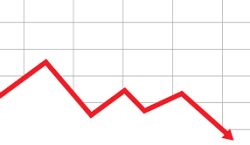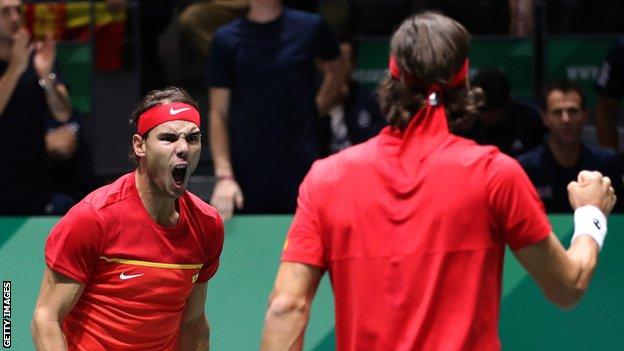

Great Britain go into this week’s Davis Cup Finals with each team member having had the “best year of their careers”, says doubles player Joe Salisbury.
Salisbury, the world number three, is joined by Cameron Norrie, Dan Evans, Liam Broady and Neal Skupski in a squad aiming to improve on 2019’s semi-final defeat by eventual champions Spain.
Britain play France and Czech Republic in the group stage on 27/28 November.
“Everyone is in good form, playing well and feeling confident,” said Salisbury.
Salisbury, 29, has enjoyed another impressive year alongside American Rajeev Ram, winning the US Open in September – their second Grand Slam title together – and finishing as runners-up in the ATP Finals on Sunday.
Norrie, 26, has climbed to 12th in the singles rankings after a stunning breakthrough season in which he landed the prestigious Indian Wells title, while 31-year-old Evans reached a career-high 22nd and won a first ATP event.
With Andy Murray skipping the event, 27-year-old Broady was picked as the third singles player. He achieved a career-high ranking of 121 following a first ATP Challenger singles title in September.
Skupski, 31, is the second specialist doubles player in the squad following a season where won his first Grand Slam title in the Wimbledon mixed doubles, broke into the world’s top 20 and reached his maiden ATP Masters final alongside Evans.
“I think we know whoever steps on the court, and whoever that’s against, that we can win. Whether that’s Cam and Evo with the singles or whoever plays the doubles,” said Salisbury, who is making his debut in the event.
“We have definitely got a good chance of doing well.”
After last year’s event was cancelled because of the coronavirus pandemic, the Davis Cup Finals returns for its second edition with a slightly different feel.
The 18-nation finals, self-styled as the ‘World Cup of Tennis’, was held entirely in Madrid when it launched in 2019, but will stretch across three cities – Innsbruck and Turin joining the Spanish capital as a host – this year.
The semi-finals and final will be held in Madrid from 3 to 5 December.
Britain play their group matches behind closed doors in Innsbruck with Austria having re-entered a full lockdown because of rising coronavirus cases.
With the Davis Cup synonymous with a boisterous and partisan atmosphere, Salisbury said it was “shame” Britain’s opening matches would be played without fans.
“Hopefully we can get through the group stages and get to Madrid where there will be a crowd,” he added.
Teams play two round-robin ties, each featuring two singles and one doubles rubber which are all played over best-of-three sets.
The top teams from each group and the two best runners-up qualify for the quarter-finals.
Three-time Grand Slam champion Andy Murray, who led Great Britain to the Davis Cup title in 2015, ruled himself out to rest and because he was not sure he “deserves to play in that team”.
Captain Leon Smith says it was the right decision for the Scot but that he would nevertheless have added an extra dimension.
“The selfish hat can go on and as a captain you are wanting your best possible squad,” he said told BBC Sport.
“It’s good to have options. If you’d had someone like Andy, who is back playing very, very well, it would have just added a layer of options into the team.
“But more than that it’s the presence as well, the experience, the fun, he’s a good friend of everyone in the team. It comes on the practice court – the intensity and the operating standards.
“But he has already rubbed off on the team, you watch how they are all operating – there is no doubt that their standards are very, very high.”
He added “this is a really strong team” and that “this is a better place than we’ve been for a number of years”.
World number one Novak Djokovic is the leading star name playing in the event, fronting a Serbia team aiming to improve on an emotional quarter-final defeat by Russia in 2019 that left the players close to tears.
After a year where he won the Australian Open, French Open and Wimbledon titles, 34-year-old Djokovic said he is looking forward to trying to end 2021 with another high.
“I like the way I’m playing, I like my chances against anybody in the Davis Cup,” he said.
“Obviously, it is a team competition, it doesn’t depend on me only, so hopefully the other guys are fit and ready.
“I’m very motivated to play for my country.”
Spain are the defending champions, but are without Rafael Nadal – a 20-time Grand Slam champion like Djokovic – as he recovers from a foot injury, world number 19 Roberto Bautista Agut, and Carlos Alcaraz, who tested positive for Covid-19 on Thursday.
The rest of the squad, which includes world number 20 Pablo Carreno Busta and world number 45 Albert Ramos Vinolas, had PCR tests for the virus, tournament organisers said without revealing further details.

With Russia banned from international competition for doping violations, the country’s players will compete under the banner of their national federation. A strong squad is led by US Open champion Daniil Medvedev, while also featuring world number five Andrey Rublev, 2020 Australian Open semi-finalist Aslan Karatsev and former top-10 player Karen Khachanov.
Italy have a crop of exciting young players coming through, led by Jannik Sinner and Lorenzo Musetti, with Fabio Fognini providing the experience for the co-hosts.
Another nation boasting emerging talent is Canada, who lost to Spain in the 2019 final. However, their brightest young stars – Denis Shapovalov and Felix Auger-Aliassime – have pulled out through injury.
| How the nations are split |
|---|
| Group A: Spain, Ecuador, Russian Tennis Federation |
| Group B: Canada, Sweden, Kazakhstan |
| Group C: France, Great Britain, Czech Republic |
| Group D: Croatia, Australia, Hungary |
| Group E: United States, Italy, Colombia |
| Group F: Serbia, Austria, Germany |

Group stage: 25-28 November
Quarter-finals: 29 November-2 December
Group D winner v Group E winner (Turin)
Group C winner v Group F winner (Innsbruck)
Group B winner v Best runners-up (Madrid)
Group A winner v Best runners-up (Madrid)
-bbc.com